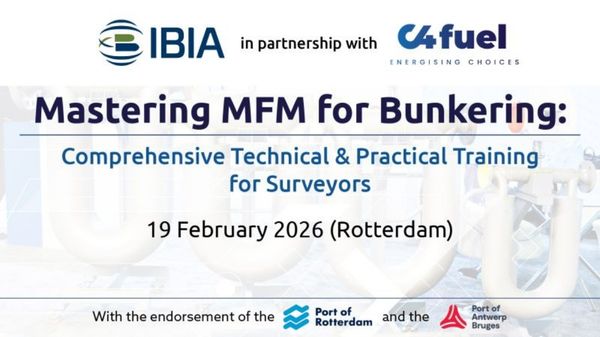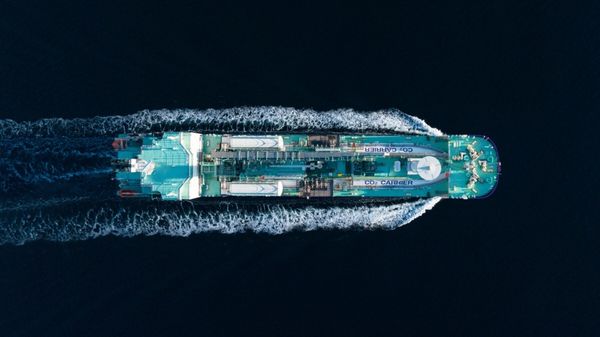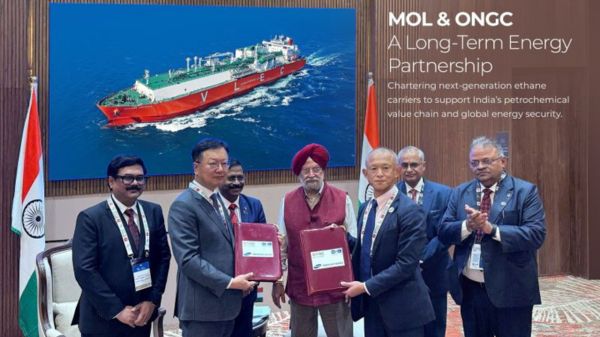
ExxonMobil has begun supplying Hapag-Lloyd with B30 marine bio fuel oil in the Amsterdam-Rotterdam-Antwerp (ARA) region following the completion of a signed agreement between both parties.
The supplier notes that it performed a biofuel delivery in ARA that was a 0.50% sulphur residual-based fuel (VLSFO) processed with waste-based fatty acid methyl esters (FAME).
The resulting blend is said to have met ISO 8217:2017 marine fuel specifications, with the FAME content complying with EN 14214 requirements and ISCC-certified 2nd generation, meaning that it does not compete for water and agricultural resources used for food production.
Compared with conventional petroleum-based VLSFO, ExxonMobil states that the fuel can deliver a well-to-wake CO2 emissions reduction of up to 87% for the bio-component, calculated on an energy basis using Energy Directive (2018/2001/EU Annex V) ('RED II') of the European Parliament and of the Council of the European Union — thus offering vessel operators a solution when looking to reduce the greenhouse gas emissions from their operations.
"We aim to have net-zero greenhouse gas emissions for our entire fleet by 2045 by using alternative fuels," said Jan Christensen, Senior Director, Global Fuel Purchasing, at Hapag-Lloyd. "Bunkering ExxonMobil's marine bio fuel oil blend is yet another step towards turning our commitment into a reality."
Aly Abdelmotaal, Regional Marine Marketing Manager, ExxonMobil, commented: "This agreement and delivery marks an important development for both ExxonMobil and our customers."
"By boosting our biofuel offer we can now further support the marine industry's commitment to reducing GHG emissions, in line with the International Maritime Organization’s (IMO) stated ambitions."
As previously reported, ExxonMobil completed its first trial of marine bio fuel oil in Rotterdam back in 2020, with trials carried out in cooperation with Stena Bulk.
And in August and September 2022, the supplier performed commercial trials of bio-based marine fuel in Singapore with a 0.50% sulphur residual-based fuel (VLSFO) processed with up to 25% waste-based FAME.

|
Maersk takes delivery of first methanol-capable vessel in 9,000-teu series
Tangier Maersk is the first of six mid-size container ships with methanol-capable dual-fuel engines. |
|
|
|
||

|
IBIA to run surveyor training course for mass flow meter-equipped bunkering in Rotterdam
One-day course scheduled for 19 February aims to prepare professionals for MFM-equipped bunkering operations. |
|
|
|
||

|
MOL secures two 12,000-cbm CO2 carriers for Northern Lights expansion
Japanese shipowner to deliver vessels in 2028 for cross-border carbon transport and storage project. |
|
|
|
||

|
MOL and ONGC sign 15-year charter deal for two ethane carriers
Japanese shipowner expands fleet to 16 vessels with newbuildings scheduled for delivery in 2028. |
|
|
|
||

|
Dual-fuel container ship and vehicle carrier fleet reaches 400 vessels
World Shipping Council reports 83% increase in operational dual-fuel vessels during 2025. |
|
|
|
||

|
Lloyd’s Register publishes first guidance notes for onboard hydrogen generation systems
Classification society addresses regulatory gap as shipowners explore producing hydrogen from alternative fuels onboard. |
|
|
|
||

|
Rotterdam bunker industry faces upheaval as new regulations drive up costs and shift volumes
Red III compliance costs and a mass flow meter mandate are creating operational challenges across the ARA region. |
|
|
|
||

|
VPS appoints Neil Chapman as managing director for the Americas
Maritime services company names industry veteran to lead regional operations and client partnerships. |
|
|
|
||

|
Maritime industry shifts towards LNG as alternative fuel enthusiasm stalls
Geopolitical concerns drive shipping leaders to prioritise established fuels over newer alternatives, survey finds. |
|
|
|
||

|
OceanScore reaches $5m annual recurring revenue as emissions compliance demand grows
Hamburg-based firm supports compliance workflows for more than 2,500 vessels as regulations enter operational phases. |
|
|
|
||
| ExxonMobil performs biofuel test deliveries in Singapore [News & Insights] |
| ExxonMobil completes trial of its first bio fuel oil [News & Insights] |